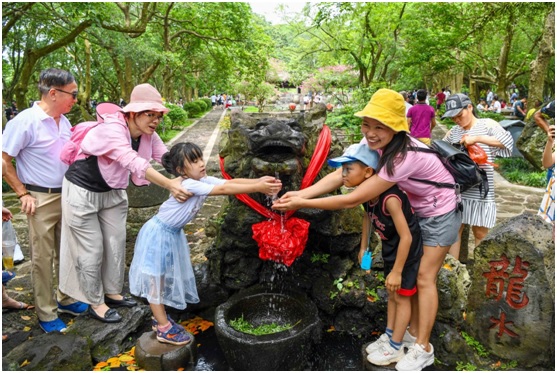Human resources are of huge importance for China’s rural vitalization. At present, there are over 17 million high-caliber farmers working in the countryside to prosper the rural regions.
The improved scientific literacy of Chinese farmers has laid a solid foundation for their overall development, and is offering stronger support for the country’s rural economy.
Bao Yuan is a young man running an aquatic product company in Qujing, southwest China’s Yunnan province that he established in 2014 after graduating from Yunnan Normal University in 2014. “Artificial breeding not only diversifies people’s choices, but also helps protect endangered local fish species,” he said.
Song Xueqin is a Gen Y female who has made her name in the Lvliang Mountains, north China’s Shanxi province by flat peach grafting techniques.
After graduation from college, Song was successively engaged in catering business, gypsum processing and sheep husbandry, but didn’t succeed in any of those.
In 2009, she heard that Chinese wild peaches can be turned into flat peaches through grafting techniques, so she asked one of her friends to bring her scions of flat peaches from northwest China’s Xinjiang Uygur autonomous region and invited an expert to impart relevant skills to her.
A year later, Song and her husband grafted flat peach scions onto over 4,000 wild peaches on a hillside near Hetaozhang village, Fenxi County, Shanxi province, but the fruiting wasn’t good.
“After consulting relevant materials and experts, we finally realized what cross-pollination was. The yield goes high only when varieties grafted match,” she said.
Last year, the woman received her first certification of her life – a certificate for new professional farmers.
“The countryside is never short of resources. In recent years, as people’s living standards have been raised, they are developing a larger demand for green and high-quality agricultural products. This trend is mobilizing more and more well-educated entrepreneurs who are technically skilled and know how to operate and manage businesses to go back to the countryside,” said Zuo Chenming, a senior researcher with AliResearch, a research arm of Alibaba Group.
Early in the morning, Mi Xiaohong from Yuzhong County, Lanzhou, northwest China’s Gansu province started working in a cowshed, serving the cattle with new fodder and water and cleaning the cowshed.
“The making of cattle fodder is complicated, as we must calculate how much grass and other materials we add in it and fairly decide the ratios of bran, glacial flour and salt,” she told People’s Daily, adding that the ingredients have to be adjusted according to different growth periods of the cattle.
Mi, always attending training programs held by the county government, has become a specialist in cattle husbandry.
“I made many detours as a layman, but now I’m often consulted by fellow villagers,” she said, adding that only by continuous learning can she solve more problems.
Today, local authorities across China are issuing new policies and measures to encourage farmers to study technologies. Shandong province has launched a professional title evaluation system for professional farmers, and Jiangsu province’s Kunshan is offering free college education for professional farmers. In Gansu Province, training sessions are launched for heads of professional cooperatives and animal epidemic prevention coordinators, in an effort to bring technologies to the farmland and find solutions to agricultural problems.
People’s Daily

Leave a Reply